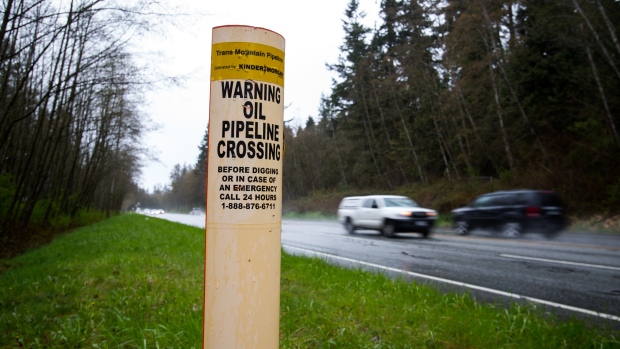Apr 13, 2018
Top Kinder Morgan Canada investor urges Trans Mountain shutdown

Kinder Morgan Canada should do far more than just walk away from its $7.4-billion Trans Mountain pipeline expansion plan, as far as one of the company’s largest shareholders is concerned.
“I’ve talked to them and I’ve suggested that they shut their main [Trans Mountain] pipeline down,” Greg Guichon, chairman of Barometer Capital Management, which owns roughly 500,000 Kinder Morgan Canada shares, told BNN via telephone.
Alberta is threatening to pass a new law – the Preserving Canada’s Economic Prosperity Act – that could potentially restrict shipments on the existing Trans Mountain pipeline, which has been delivering roughly 300,000 barrels of crude oil from northern Alberta to the Vancouver area since the 1950s.
GasBuddy senior analyst Dan McTeague has estimated such a move could immediately push British Columbian gasoline prices above $2 per litre, but Guichon believes the B.C. government should be punished further if it fails to allow construction to proceed before the company’s May 31st deadline.
“I think the company should sue the government of B.C. for breaking the law so they can recover their costs,” Guichon said. “There is a legal liability here for the B.C. government and really [Kinder Morgan Canada] should be able to recover their costs plus interest.
Kinder Morgan Canada says it has spent $1.1 billion advancing the project to date, with roughly half of that outlay occurring since the company went public on the Toronto Stock Exchange under the ticker KML in May 2017. The threat to abandon the project is genuine, Guichon said, though not everyone believes May 31 is a hard deadline.
- What steps Trudeau can take to save Trans Mountain as he faces a 'constitutional crisis'
- Investors can't shoulder Trans Mountain political risk: McKenna
- Canada’s shooting itself in the foot if resources don’t get out: Barton
MORE ON TRANS MOUNTAIN
“I’d be shocked if they walked away [from the expansion project],” Darryl McCoubrey, vice president of Veritas Investment Research, which covers KML with a buy rating, told BNN via telephone. “It just seems like it would be a really poor decision because there is still value there even if they miss their 2020 startup date.”
Initially expected to be operational at the turn of the decade with an expanded capacity of nearly triple its original size, various legal and regulatory challenges have forced Kinder Morgan Canada to delay its startup timeline beyond September 2020 at a cost of several hundred million dollars. Every additional month of delay, the company has said, will cost $75 million in lost revenue.
Guichon agrees there is “no question” Kinder Morgan Canada “would leave value on the table,” but he supports the company’s ultimatum as he believes walking away would still be preferable to months or even years of further uncertainty and he says it would not change his thesis around owning the stock.
“We would just go back to the same risk-reward situation we had at the IPO” if the company does walk away, Guichon said, noting the stock was likely worth as much as $16 per share even without being able to expand Trans Mountain. That would be one dollar-per-share below the IPO price, but that is still far more optimistic than McCoubrey’s estimate of where the stock would go if the project falls through.
“If they were to walk away from the project with no clear cut plan for growth, you are looking at a stock that would trade down toward $10 or $11 per share,” McCoubrey said. The lowest Kinder Morgan Canada’s shares have ever traded was $15.50 on July 23.
There is more to Kinder Morgan Canada than just the Trans Mountain pipeline, despite the disproportionate level of attention given to its core asset.
In addition to owning two pipelines that branch off from the main Trans Mountain line to supply Vancouver International Airport with jet fuel and five refineries in the Pacific Northwest with their feedstock, the company also controls roughly 15 million barrels worth of crude oil storage in the Edmonton area and has ownership stakes in two nearby crude-by-rail terminals.
Those crude-by-rail assets would become more valuable if the expansion project fails, since oil sands producers would be forced to find alternative transportation options given their output is growing while current pipelines are already full. Guichon argues those extra assets give Kinder Morgan Canada the economic cover it would need to walk away from the Trans Mountain expansion.
“It is pretty binary for them: either they can build it or they can’t,” Guichon said.
“But the fact that we as a country are selling our oil at such a discount to world prices because we just can’t get it to market, all that potential corporate revenue and tax revenue that we are letting go every day, it is just criminal.”




